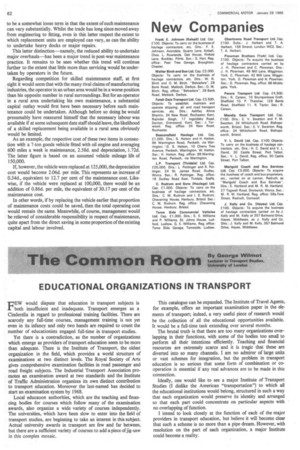EDUCATIONAL ORGANIZATIONS IN TRANSPORT
Page 64

If you've noticed an error in this article please click here to report it so we can fix it.
VEW would dispute that education in transport subjects is both insufficient and inadequate. Transport emerges as a Cinderella in regard to professional training facilities. There are scarcely any full-time courses, management training is not yet even in its infancy and only two hands are required to count the number of educationists engaged full-time in transport studies.
Yet there is a contradiction, as the number of organizations which emerge as providers of transport education seem to be more than adequate. There is the Institute of Transport, the oldest organization in the field, which provides a world structure of examinations at two distinct levels. The Royal Society of Arts gives comprehensive examination facilities in road passenger and road freight subjects. The Industrial Transport Association promotes an examination award at two standards and the Institute of Traffic Administration organizes its own distinct contribution to transport education. Moreover the last-named has decided to start an examination system by 1968.
Local education authorities, which are the teaching and financing bodies for courses which follow many of the examination awards, also organize a wide variety of courses independently. The universities, which have been slow to enter into the field of transport studies, are beginning to take an interest in this subject. Actual university awards in transport are few and far between, hut there are a sufficient variety of courses to add a piece of jig-saw in this complex mosaic. This catalogue can be expanded. The Institute of Travel Agents, for example, offers an important examination paper in the elements of transport; indeed, a very useful piece of research would be the collection of all the educational opportunities available. It would be a full-time task extending over several months.
The brutal truth is that there are too many organizations overlapping in their functions, with some of the bodies too small to perform all their intentions efficiently. Teaching and financial resources are extremely scarce and it is tragic that these are diverted into so many channels. I am no admirer of large units or vast schemes for integration, but the problem in transport education is so serious that some form of combination or cooperation is essential it' any real advances are to be made in this connection.
Ideally, one would like to see a major Institute of Transport Studies (I dislike the American "transportation") to which all the educational institutions would belong, structured in such a way that each organization would preserve its identity and arranged so that each part could concentrate on particular aspects with no overlapping of function.
I intend to look closely at the function of each of the major providers in transport education, but believe it will become clear that such a scheme is no more than a pipe dream. However, with resolution on the part of each organization, a major Institute could become a reality.












































































































